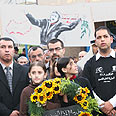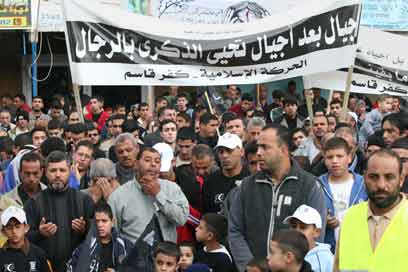
Kfar Kassem: About time State admits its mistake
Thousands march Sunday morning to mark 50th anniversary of massacre committed by Border Guard officers against dozens of Kfar Kassem residents. Residents recall day when they returned from work and became targets of police's fire. Speakers also link between massacre and today's Lieberman
About five thousand people participated in a march to mark the 50th anniversary of the incident remembered as the “Kfar Kassem massacre." Some of the children in the march waved black flags, while others wore black shirts or special hats.
“Kfar Kassem, we haven’t forgotten; the blood of the slain flows through us” and “Enough of slaughter” were just two of the slogans written on banners which the marchers held.
The opening of a museum commemorating the massacre and the slain was to take place Sunday afternoon, and Sunday evening was to see a mass rally with the participation of a row of Arab leaders.

Standing over graves of residents killed in massacre (Photo: Ronen Boidek)
Mahmoud Frej (74), a resident of Kfar Kassem, remembers what occurred 50 years ago very well. He was injured by Border Guard fire and his brother and friend were killed.
“Me and my brother were working at the time in the quarry – grinding rocks to establish this country – and we were in a hurry to get home,” he told Ynet.
“We got home at around five and we knew the curfew had been announced, but what could we do? We wanted to get home to feel safer. At five o’clock, just as we arrived, they opened fire at us. I was shot a number of times in my leg, and my brother Ahmed was killed in front of me along with our friend,” Frej said.
Frej recounted that the memory remained fresh in his mind and accompanied him until today. “The killing isn’t over, it’s everywhere, so when we hear that somewhere someone was killed, it reminds us that we were shot too,” he said while looking at his brother Ahmed’s grave.
The cemetery in Kfar Kassem, “Maqbarat al-Shuhadah”, can easily be recognized for its tombstones of the slain painted in striking green.

Photo: Ronen Boidek
Decades later, Frej and the families of Kfar Kassem have one explicit request; that Israel officially acknowledge the massacre and mark it as it marks its official memorial days.
“We demand that the country admit that what happened was wrong. At the time, the press said that we were to blame because we were throwing stones at the soldiers, but that was a lie, we were at work and when we got home were shot for no reason,” Frej said.
He continued, “Every year we are asked about these incidents, go ask Shimon Peres instead, who was the Director of the Defense Ministry, why we were shot at. If the government officially acknowledged that, I would feel relief.”
Mahmoud's nephew, Mahmoud Frej, who lost his father when he was only three and a half years old, walked by his uncle's side during the march.
"I don’t know my father, I don’t remember anything about him, as well as that day," he explained. "At our house they say that my father would work and bring us food home, and they killed him. I carry this with me every day.
"If the State officially acknowledges this it will make it easier for us, because at the moment I feel that he was killed for nothing," he added.
'After 50 years, Arabs' prize is Lieberman'
At the end of the march, Kfar Kassem Council head Sami Issa, referred to the political issue of the past two weeks – Avigdor Lieberman's inclusion in the government.
"Such people have no place not in the government and not in the Knesset. The peace camp in Israel should get up and shout, 'Stop violence,' 'Stop the murder and occupation.' We will be behind you."
Talking to Ynet, Issa added: "Although it is an unplanned timing, Lieberman's inclusion comes on the day of the (massacre's) anniversary, and therefore we decided that we must voice a statement on the issue. The main message is not to make room for Lieberman and similar people."
Meretz member Isawi Farij, who also sought to be part of the party's Knesset list in the May elections, also took part in the rally.
"It is absurd that after 50 years of massacre, the Arab population in the State of Israel receives the 'prize' – Lieberman joining the government," said Farij, who lost one of his grandfathers in the massacre.
"Now Lieberman is officially joining and they say he will be the minister of strategic threats. The question is what is the strategic threat – is it the Arab population inside the State, the Iranian threat, or both. I hope his real face will be exposed soon and the Jewish public will know what threat Lieberman poses," he added.










